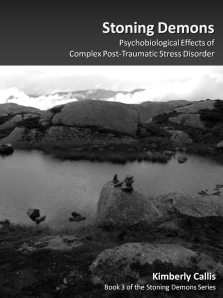Kimberly Revis Callis's Blog, page 5
October 29, 2014
Physical Health and Complex PTSD: Book 3 of the Stoning Demons Series
I want to challenge you to think about post-traumatic stress disorders in a new way… to move beyond thinking of PTSD as mental illness and see it for the systemic neuroendocrine disorder that disrupts the normal balance of energy, emotion and functioning.
Most of the more common symptoms of PTSD – anxiety, depression, confusion, eating disorders, addiction and even suicidality – can also have physiological sources. In the majority of cases, there are underlying illnesses and chronic imbalances that contribute to mental and emotional symptoms.
People with CPTSD experience a variety of psychological problems, such as depression, other anxiety disorders, and drug and alcohol use problems; however, CPTSD can also have an impact on your physical health. In fact, people with CPTSD have been found to be at greater risk for developing physical health problems, including heart disease, obesity, gastrointestinal problems and adrenal issues.
There is a close relationship between exposure to abuse during childhood and several of the leading causes of death in adults. Diseases including heart disease, cancer, lung disease, and liver disease have been tied to childhood trauma. The findings in many emerging studies suggest that the impact of these adverse childhood experiences on adult health status is cumulative.
As more and more research looks at the effects of abuse, neglect, and maltreatment, findings are showing that noticeable impacts are seen through adulthood, which illustrates the connection between developmental and psychopathological aspects of childhood traumas. The effects of trauma and stress are cumulative. When significant secondary traumas occur, the risk of developing CPTSD symptoms increases.
 (ebook) $2.99 immediate download
(ebook) $2.99 immediate download
Explore the rest of the Stoning Demons series here.


October 26, 2014
Article: It’s True, Medical Cannabis Provides Dramatic Relief for Sufferers of Chronic Ailments
From ScienceBlog
Though controversial, medical cannabis has been gaining ground as a valid therapy, offering relief to suffers of diseases such as cancer, Post-Traumatic Stress Disorder, ALS and more. The substance is known to soothe severe pain, increase the appetite, and ease insomnia where other common medications fail.
Read the full article at: It’s True: Medical Cannabis Provides Dramatic Relief for Sufferers of Chronic Ailments – ScienceBlog.com.


Article: Marijuana can prevent PTSD symptoms
From ScienceBlog
Cannabinoids (marijuana) administration after experiencing a traumatic event blocks the development of post-traumatic stress disorder (PTSD)-like symptoms in rats, according to a new study conducted at the University of Haifa and published in the journal Neuropsychopharmacology.
Read more at Marijuana can prevent PTSD symptoms – ScienceBlog.com.


October 14, 2014
Article: Twelve Benefits of Magnesium – The Anti-Stress Mineral
The Anti-Stress Mineral
By Poliquin Group™ Editorial Staff
http://www.poliquingroup.com/ArticlesMultimedia/Articles/Article/669/Twelve_Benefits_of_Magnesium.aspx
This important article outlines the benefits of adding magnesium to improve stress management and address many of the symptoms common in sufferers of PTSD, including anxiety, depression, insomnia and cognitive issues. In the last several months, I have made a point of adding key electrolytes to my diet and found relief from most of my symptoms. For the first time in years I found calm and rest… and clarity, making remission possible as long as I manage my stress levels as well.
I prefer natural food sources, rather than supplements, but I have to admit to using the quick fix that Powerade or other electrolyte drinks when I’m feeling bad. There are many unprocessed foods that are good sources for magnesium and other minerals that are needed to support parasympathetic nervous system function, such as those listed here.


September 28, 2014
Neurotransmitters and your health
Neurotransmitters and your health by Dr. Steve Rosman.
Excerpted from the “Institute of Education” section of the NeuroScience website (www.neurorelief.com)
Each neurotransmitter can be classified as either excitatory or inhibitory and each has specific functions in the body and potential roles relative to the understanding of certain diseases or symptoms.
http://drsteverosman.com/2011/08/neurotransmitters-and-your-health/trackback/


September 17, 2014
Complex PTSD and chronic illness
CPTSD associated with Developmental Trauma can have broad systemic impacts on long term health. Chronic exposure to stress keeps the mind and body on high alert. Subsequent traumas result in compounded psychological injury and increase the degenerative biological effects of chronic triggering of the fear response system.
I didn’t make the connection between my failing physical health and my mental illness for quite some time. I considered most of the relatively mild, infrequent symptoms I experienced to simply be a part of aging. Looking at the studies, results suggest that the cumulative effects following multiple traumas may lead to chronic illness. Blood sugar regulation problems, failing eyesight, digestive issues, tremors or trembling, chronic or heavy self-medication, and addiction are other health issues that are often seen in those who also have Complex PTSD.
At the point that I ran out of questions about my childhood, once I had worked through all of my trauma inventory, I found that I was still experiencing symptoms. CPTSD was still having an effect on my life and I was still replaying the worst criticisms of myself in my head. I had looked at each situation, evaluated it, worked on it, come to a point of understanding and acceptance… but I was still doing the same things to myself that I had done through my entire life. I called myself names, I sabotaged my own life, and I fell into spells of wallowing in self-hatred and despair. I had to rebuild, but that part seemed to come last and cost the most energy.
I found I was having some fairly unsettling issues and was quite worried about what was happening to me. My heart rate was often way too fast. That familiar feeling of butterflies in my stomach that had always been the signal of a looming panic attack was constant… even when I had experienced no triggers or had any real stress in my life. I felt like I was in a state of constant anxiety, but had absolutely no reason (that I was aware of) to feel the way I did. I was also fighting issues with low blood sugar alternating with pre-diabetic blood glucose levels.
I finally confirmed endocrine system issues. I thought I was having some kind of subconscious trigger response, that maybe there was something that was setting me off that I couldn’t identify. Finding that long term stress causes these issues was a relief. It’s helpful to know that the symptoms I typically associate with solely mental processes have a solely physical source at times. I don’t have to go looking for more CPTSD problems to solve.
Discovering this gives me new motivation. I know that I must keep working on my recovery, keep up with my maintenance and take other steps to protect my endocrine system. It’s not just my mind that will benefit, my body will too. Eating healthy whole foods, finding plenty of restful moments, and keeping up my exercise all have a new importance in my life. I’ve learned that sometimes just skipping a meal can cause me to have physical anxiety symptoms. Being too tired or eating too much sugar can make me feel lethargic, which feels like depression symptoms. Drinking alcohol causes blood sugar spikes and crashes, which makes me feel like I’m on a roller coaster of panic. Keeping a routine helps me to know when I am really dealing with triggers and not imbalances in my system.
I gathered information from several studies to help me compile statistics on the correlation between Complex PTSD and chronic illness.
PTSD and Physical Comorbidity Among Women Receiving Medicaid: Results From Service-Use Data
Disorders of Extreme Stress: The Empirical Foundation of a Complex Adaptation to Trauma
Mental disorders and medical comorbidity
There is also growing evidence that conditions like depression and suicidality can be detected in medical tests… further demonstrating the physical aspects of mental illness.
First Blood Test to Diagnose Depression
A blood test for suicide risk? Alterations to a single gene could predict risk of suicide attempt


September 16, 2014
Cannabis therapy in Complex PTSD recovery
For the last five years, I have been using Cannabis to support my recovery. After having severe side effects from psychiatric medication, I turned to marijuana because I simply could not find anything that could help me cope with the severe symptoms I was dealing with. I knew nothing at that point about cannabis as therapy. I had never heard of the endocannabinoid system. In fact, I was ashamed and desperate about my marijuana use for quite a long time.
I learned about it a bit by accident, even though the news and science journals seemed to be covering medical marijuana more and more. I looked into the benefits more to help with chronic pain and digestive issues from a separate health issue. I found some eye-opening articles about studies that show that this amazing plant can have benefits for mental health and trauma recovery. I was amazed (and happily so) to find that cannabis can help manage Complex PTSD symptoms including anxiety, hyper-arousal and depression. Cannabis can help maintain remission, provided it is used properly and there is a deliberate approach to reducing stress and avoiding further traumatization and triggers.
Of course marijuana is not a panacea. It does not — on its own — fix all of the issues that a person with CPTSD needs to address. It is easy to get stuck using marijuana and not moving forward in recovery. I did that for a while. But, I found that my need to get my life back in order was strong enough that I finally pushed myself into really working on being better. Knowing that about one third of people with Complex PTSD do not fully recover, I felt that was too great a risk and that I needed to look for every resource I possible could find that would improve my mental and physical health and let me live fully again.
It has been a trail-and-error process. Finding a balance is hard. Like others with this condition, I had recurring episodes of relapse and remission. As I learned more about the effects of Complex PTSD on physical health, I added nutritional therapies and started to exclude certain foods, food additives and chemicals. I slowly added necessary supplements, but only when I couldn’t find a natural food source for the micronutrients I need to be well.
I have been in remission for nearly three months now, my longest period of freedom from CPTSD symptoms since my diagnosis. It feels great, but I have to stay with my program. Cannabis is still a part of my routine. It keeps my anxiety down, treats my pain and occasional insomnia and helps me maintain an appetite. I have started to add exercise and I work more often outside home than I have before.
For anyone working on CPTSD recovery, it is important to learn how your body feels versus what is projected in your mind. Sometimes anxiety symptoms can be triggered by blood sugar imbalance and food additives. It can take several days to clear your body of the effects of food chemicals and excessive sugar. Depression and fatigue can be caused by nutritional deficiencies. Foggy brain may be caused by an electrolyte imbalance. Clean eating, eliminating processed foods, sugars and all sugar substitutes may be the change needed that will get you feeling strong and stable again.
Here are some great resources for those who want to read more:
The evidence behind marijuana and PTSD
Marijuana could keep PTSD in check, study suggests
The links between sugar and mental health
Diet, nutrition and your mental health
Sugar and mental illness (glutamate)


August 28, 2014
#TBT: The Impact of Trauma
Another excellent article by Dr. Kathleen Young.
 Originally posted on Dr. Kathleen Young: Treating Trauma in Tucson:
Originally posted on Dr. Kathleen Young: Treating Trauma in Tucson:
It is Throwback Thursday and that means another post from the past. This is one of my favorite posts and a good place to learn some basics about the effects of trauma.
The Impact of Trauma
I’ve defined what therapists mean when we talk about trauma. Now I’d like to elaborate on its impact and why you might want to seek therapy for help in the aftermath of traumatic experiences. How does it impact a person and what can be done about it?
Trauma impacts many and has further reaching consequences than is usually understood. Kessler et al. (1995) found that 60% of men and 51% of women in the general population reported at least one traumatic event at some time in their lives. Almost 17% of men and 13% of women who had some trauma exposure had actually experienced more than three such events. As a therapist, I expect…
View original 484 more words


August 27, 2014
Article: Is Fast Food Making Us Depressed?
This is an outstanding article on BBC which explains the connection between food and mental health in very clear and compelling terms. I have been a long time supporter of nutritional and natural therapies for treatment of depression and anxiety and made them a key part of my own recovery program, along with marijuana, of course.
Interestingly, this may be looking at two sides of a similar issue. Bad food can increase inflammatory response and cannabis has anti-inflammatory properties. But, without a change in diet, I never really felt better consistently. I have definitely found more stability, and even remission from my PTSD when I changed my diet. I’ve been able to reduce my use of cannabis and almost eliminate that sense of dependency I had on it. Not only that, my cognitive function has been improving steadily over the last several months.
So, eat well… and read this article.
http://www.bbc.com/future/story/20140826-is-fast-food-making-us-depressed


August 26, 2014
An informed patient’s perspective on Complex PTSD
Stoning Demons is a series of books on complex post-traumatic stress disorder written from the perspective of an informed patient. The series shares the experiences, insight and resources used over the course of a four-year self-managed recovery program. You can purchase print or digital copies here by Paypal or credit card or on the Amazon, Smashwords, Barnes & Noble or Apple websites.
Book 1: Childhood Trauma is a Primer for Complex PTSD
Book 1 explains how trauma experienced in childhood can prime a person for development of Complex Post-Traumatic Stress Disorder later in life. Exploring developmental psychology can be extremely helpful for understanding the deeper effects of CPTSD. Reading about it helped me as a patient in surprising ways. My recovery has led me to look at childhood and its foundation for development of emotional, relational, self-regulatory and self-image imprints into adulthood in a clearer, less emotional way. It helped me detach a bit from experiencing my pain and move toward understanding it.
 (ebook) $2.99 immediate download
(ebook) $2.99 immediate download
 (paperback) $3.99 + shipping, allow 3-4 weeks for delivery
(paperback) $3.99 + shipping, allow 3-4 weeks for delivery
Book 2: Symptoms and Progression of Complex PTSD
Complex PTSD takes a progressive pathology, with symptoms worsening over successive traumatic experiences or during periods of elevated stress. Complex PTSD has its foundation in childhood trauma, impacting our development and undermining our mental and physical health for a lifetime.We tend to ignore the lifelong effects of trauma, with the misconception that children are inherently resilient. Those of us who experienced trauma in childhood know the truth of it. We are changed and shaped by those traumas and the response of others in supporting us through them. As adults, we are not separate from who we were or what we experienced as children. We remember it, if we are battling Complex PTSD, we are reliving it.
 (ebook) $2.99 immediate download
(ebook) $2.99 immediate download
 (paperback) $3.99 + shipping, allow 3-4 weeks for delivery
(paperback) $3.99 + shipping, allow 3-4 weeks for delivery
Books 3 & 4 coming soon!










